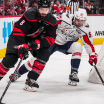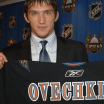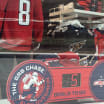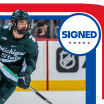Since the NHL was founded in 1917-18, more than 8,000 players have suited up for at least one game. Including goaltenders, only 356 of them have managed to stay healthy enough and effective enough to remain in the League long enough to play 1,000 games.
A Grand Occasion
It's N1KY Night in D.C. as Caps Honor Backstrom's 1,000th game

Of those 356 players, only 68 of them - less than one percent of all players who've ever played in the league - have achieved the 1,000-game milestone with the same team. On Thursday night against the Buffalo Sabres at Capital One Arena, Washington center Nicklas Backstrom joins that rare and elite group when he plays in his 1,000th career NHL game, all of them in a Capitals sweater.
While 11 players have played their actual 1,000th game in a Caps uniform and 46 of the players who have skated in 1,000 games have played for Washington at some point in their career, Backstrom and Caps captain Alex Ovechkin are the only two players who have played 1,000 games in the franchise's 46-season history. Ovechkin played in his 1,000th NHL game on April 1, 2018.
Backstrom and Ovechkin are the foundation of hockey in Washington for the last decade and a half, and both are future Hockey Hall of Famers. Caps fans in the area and around the world have fortunate to witness the exploits of the two best players in franchise history, whose careers started just two seasons apart.
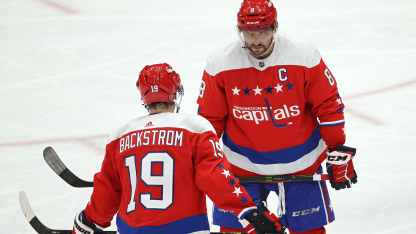
"First of all, we're both really fortunate to be able to play 1,000 games with the same franchise and organization," says Backstrom. "I think that's just great. And how we clicked the first time we met - it sounds like we're an old a married couple - but it's just crazy how we clicked the first time we met and how we became friends, and how we played together and how we connected on the ice. To be able to play 1,000 games with the same team, it's pretty unreal. To be able to do it here in DC, it's great, it's awesome.
"Obviously, no one knew that it was going to happen this quick, but I think a lot of the credit goes to Bruce Boudreau, too. He bumped me up on the first line there with Alex, and after that we just stayed together there. I think over the years, we've seen those two young kids growing up to be a little more mature, being able to win the Cup and bring the Cup here to D.C. Even if I'm here playing my 1,000th game now, I still think we have more years in us and that's where our goal is, to win another Cup."
Ovechkin was the first player chosen in the 2004 NHL Draft, and Backstrom was chosen fourth overall in the 2006 Draft, which was held in Vancouver. The NHL Awards Show also took place in Vancouver that week, which is why Ovechkin was in town and able to announce the Backstrom pick from the podium, a seminal moment in franchise history. But Backstrom wasn't so sure he was headed to Washington when he entered the building that day.
"Looking back to the draft, I mean obviously I wasn't aware of where I would go," he says. "I was ranked fourth or fifth or sixth or around there, but you never really know what the teams really want.
I mean, I think I was kind of shocked that Washington picked me, but afterwards I was really happy that Washington was picking me because in their situation and my situation, I was going to be able to just come in and play. They were a bottom team back then, so I knew that I had a fair chance on making the team."
Growing up in Sweden, Backstrom didn't watch a lot of NHL hockey, and playing in the States and in the NHL wasn't really on his radar.
"I wasn't watching a lot of the NHL when I was younger," he says. "It was only on the weekends here and there, the early games we would watch. But other than that, my goal was just to play professionally in Sweden and make the national team. That was my goal when I was younger, but honestly from when I was 15 or 16 I think my career just took off. I was 16 when I made my debut in the Swedish League, and after that I was just kind of playing and then scouts are here watching you, and you hear guys talk about that and all of a sudden, I was just high up in the ranking, which was pretty incredible. But I never had that thought that I would actually make it to the NHL, so I got a little lucky."
The Caps got a little lucky that Pittsburgh chose Jordan Staal with the second overall pick in the draft and Chicago tabbed Jonathan Toews with the third pick after St. Louis started the proceedings by taking defenseman Erik Johnson first. Everyone knew the next three picks would be centers, but the order was unclear. Backstrom was an easy and obvious choice for Washington at No. 4.
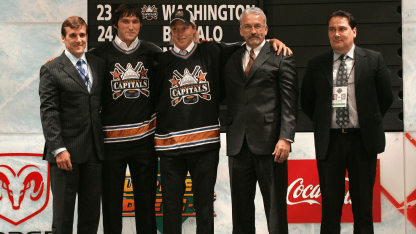
But like Ovechkin, Backstrom didn't come to the States right away to play in the NHL. He put in another season in the Swedish League, and he cites his coach at Brynas IF Gavle - along with Boudreau - as one who impacted his career.
"Going back to Sweden to two years before I got drafted, I signed a contract in the Swedish SHL. And I think I was 17 at the time, and we had this coach Leif Boork, who gave me an opportunity right away. If he wouldn't have done that, I probably would not have been drafted at number four [overall]. That's when I developed and that's when I started seeing senior hockey and a high level of play. He believed in me and the biggest thing for a player I think is when a coach believes in you and trusts you. I feel like that's what takes your game to another level.
"I obviously have to mention Bruce, too. He was the one who really gave me the opportunity to play in this League. Obviously as a player, when a coach does that you don't want to disappoint them. So I think those two come to my mind on the road to this career."
Once Backstrom did come to Washington to begin his NHL career in the summer of 2007, the team reacquired veteran Swedish center Michal Nylander to help mentor the 19-year-old Backstrom, and to help him adjust to life in the U.S.
"I think looking back, that helped me too, especially a Swede like Michael and his family," recalls Backstrom. "They really helped me a lot to adjust to life in the U.S. I have them to thank for a lot, just helping me out. I was just a kid from Sweden, and sometimes I felt lost, so that was great to have them as a support."
After road games in those days, Backstrom and Nylander often be could be seen on the team plane, huddled around a small DVD player watching their shifts together from recent games.
"Michael helped me out on the ice a lot, too," says Backstrom. "He likes to talk about hockey and how we played back then; I think we even started [on a line] together. So we were playing together with each other, and I remember we were sitting and talking about how we how we can be better every game. That was something different for me. I was just honored to be able to watch the game with him and play with him, and he actually taught me a lot."
One thing Nylander didn't have to teach Backstrom was the defensive side of the game. Few teenagers have ever entered the league as accomplished away from the puck as Backstrom. His hockey sense and vision helped fuel his defensive acumen, but it was baked in when he was still in his formative years in Sweden.
"I started playing senior hockey pretty early, and that was the responsible thing you have to learn there, and also about positioning and how important it was to play both ways," says Backstrom. "I think it just comes with how I grew up as a player and how I developed, so I knew I needed to play that way. There were a couple of Swedish players too, that I was watching growing up and they were two-way players; they were really good defensively as well, so maybe has something to do with that too."
Asked to name those players, Backstrom rattles off three names.
"Henrik Zetterberg, Mats Sundin, Peter Forsberg," he says. "All those guys that were centermen and were really good at playing both ways all the time. Growing up in Sweden, you've got to learn how to play defense, too. It's not just offense obviously."
But even with Nylander as a mentor, Backstrom cites the early weeks of his rookie season as a tough time for him, a time when he was still somewhat unsure of his footing and his role on an rebuilding Capitals team.
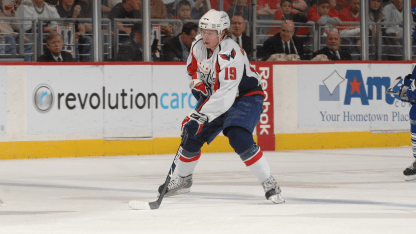
"I would have to say that maybe the first couple of games - maybe the first 20 or 30 games - I wasn't really sure what role I was going to get here," admits Backstrom. "Back then they were moving the lines around a lot, and I was up and down. I was playing with all kinds of players. I was playing left wing, playing center some games. It was just those couple of games that I was kind of wondering if I actually belong here and if they want me.
"But at the same time, I was just grinding and I knew if I played my game and got used to the system and everything, it'd be fine. But yeah, those first 20 games or something would be when I maybe doubted myself."
Boudreau took over the coaching reins from Glen Hanlon on Nov. 22, 2007. A day later - on Backstrom's 20th birthday - when Boudreau made his debut behind the Washington bench at a Black Friday matinee match in Philadelphia, he put Backstrom in the middle of the fourth line with Donald Brashear and Matt Bradley as his wings. Brashear scored a goal, and Backstrom scored the overtime game-winner and added a pair of assists.
It was the first of Backstrom's 82 career games with at least three points, and the beginning of the Caps' "rock the red" era can be traced back to that day, when the team that started the season with a league-worst 6-14-1 record turned it around and roared its way to a Southeast Division title by winning 15 of its last 19 games and each of its last seven to claim the crown on the final day of the regular season.
"The second half of that season was just incredible with how we actually battled back and made it to the playoffs," recalls Backstrom. "I mean, the way we played the first half, we shouldn't even be close to the playoffs. But it just started the "rock the red" era.
"From just eight or nine thousand [people] showing up at the games [at the beginning of the season], we started winning at the end of that year and we were close to making the playoffs, and they started this "rock the red" and all of a sudden the whole arena sold out and everyone - and I mean everyone - started talking about the Caps, everyone knew about the Caps. It was just incredible how we were able to be part of that, to see the whole community come together and cheer for a team, it's just, yeah, it was spectacular."
Backstrom and Ovechkin helped lead the Caps to the franchise's first Stanley Cup championship in the spring of 2018, in Backstrom's 11th season in the NHL. Washington made the playoffs in 10 of those 11 seasons, but it took 10 trips to the playoffs to break through and finally win the Cup.
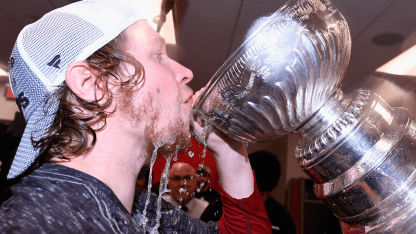
Did a decade of playoff heartache make it even sweeter when he finally hoisted the Cup in 2018?
"Yeah, absolutely," answers Backstrom without hesitation. "I think so for sure. I think we appreciate it way more, especially as many years as we've been waiting. I just think that we appreciate it a lot."
Of all the players on that 2007-08 Caps team in Backstrom's rookie season, only Backstrom and Ovechkin are still playing in the NHL. That team laid the foundation for the current era of Caps hockey that culminated with the Cup title in 2018.
"I think we should be really proud about it," says Backstrom. "I think we got hockey back in Washington, if you look back to when we started there. You can see it now, it just keeps going and I feel like we had been trying to build something good for so long, and we finally did win it. And hopefully we can keep that winning mentality, because that's what you want to have in a team, you want to have this winning mentality going forward, not just when we play now, but for when we retire and then someone else takes over."
Caps fans are hoping that retirement is still several years off on the horizon. Over the course of those thousand games, Backstrom has put some miles on, and he has piled up some numbers, especially in relation to that trio of Swedish players
He has surpassed both Zetterberg and Forsberg in career assists and points, and he is 71 assists shy of matching Sundin's total; Sundin played 347 more games than Backstrom has played to date, and perhaps Backstrom's most impressive achievement to date is his average of .71 assists per game, the best rate of any Swedish-born player in League history with 750 or more games played.
"I would have never imagined that when moving over here," says Backstrom. "But at the same time, I feel like I always wanted to be a good player, I always wanted to be responsible player. And I feel like with the teammates I've had too, that has helped out a lot with the numbers. And I'm playing on a good team, too - a winning team always helps. I think it's a combination of everything, but obviously I'm honored to be up there with those guys and their numbers."

